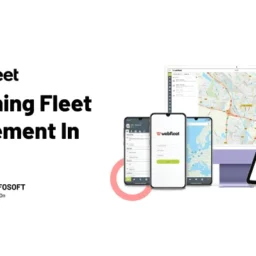
Table of Contents
Running a fleet of commercial vehicles, trucks, and trailers is quite challenging. Whether undertaking logistics, supply chain, or construction, it is easy to be bogged down by a large and growing fleet of vehicles. This is where Fleet Management Software for Trucks comes as a solution. Today, fleet owners can turn their businesses into efficient, well-oiled machines by leveraging automation and real-time data, reducing headaches associated with owning large fleets of vehicles.
In this blog post, we will bring awareness about how contemporary truck fleet management software assists companies in maintaining and managing their fleets most efficiently and how such software and applications are important for industries that engage with commercial heavy-duty vehicles.
Why Fleet Management Software is Essential for Fleet Owners
Try to picture yourself handling tens of let alone, hundreds of trucks and other commercial vehicles on the road most of the time. Because no core oversees all of this, you are left to assume the location of vehicles, the performance of drivers, and even some mechanical problems. This can cause a lot of time wastage, frequent breakdowns, and, worst of all, high costs of production.
This is where we need the truck fleet management software to come into the picture. This solution helps fleet owners get a clear visualization of their vehicles’ location, condition, and productivity at any given time. However, the fact that such processes are automated means that the fleet managers will need to focus on problems rather than on searching for them. It makes most activities involving organizational management of trucks and other commercial vehicles to be more efficient and less of a headache.
Basic Features of Fleet Management Software
Even though every industry may employ vehicles diversely, fleet management software comprises a plethora of fundamental components that may be adjusted based on your requirements. Here are the outstanding features of fleet management software that benefit fleet managers, particularly those managing trucks and commercial vehicles, depend on to ensure a smooth operation.
- 1. Real-Time Vehicle Tracking
- 2. Fleet Maintenance Alerts
- 3. Driver Behavior Monitoring
- 4. Route Optimization and Trip Planning
How Fleet Management Software Works for Trucks and Commercial Vehicles
Fleet Management Software for Trucks
Ways of managing a fleet of trucks may be challenging when these trucks are on the move most of the time and may traverse long distances in a single day. Truck management software helps in tracking vehicle performance, safety, and other functions that apply to the management of those particular fleets. It finds its application in logistics, transportation, supply chain segments, and so on.
How It Works for Trucks:
- Real-Time Vehicle Tracking: Long distance is often associated with trucks, so location monitoring is critical. Getting real-time tracking through GPS, the position of each truck can be viewed by the fleet manager, and hence, there is the best chance to plan the best routes to avoid incidences of traffic holdups, thus ensuring timely deliveries.
- Fleet Maintenance: High usage is characteristic of trucks, and for this reason, it is important to maintain vehicles that are serviced frequently. This is where fleet management software comes in handy since it helps to schedule the maintenance of such vehicles so that breakdowns can be reduced, and in cases they occur, the intimate knowledge of where all the vehicles are at any particular time helps to reduce the downtime. Notification of when vehicles need new oil, a brake check, or the next tire rotation is good for the fleet.
- Driver Behavior Monitoring: For heavy trucks, unsafe driving means either high cost or an accident. The software tracks driving activities such as aggressive driving, excessive use of breaks, and time spent idle and provides an evaluation that leads to improved driver safety and efficiency in fuel consumption.
- Fuel Monitoring: Since trucks use a lot of fuel, it is very important that the usage of fuel is closely watched. Real-time fuel tracking is a feature of fleet management software that assists in cutting down on waste and fuel costs.
Fleet Management Software for Cars and Bikes
While big commercial vehicles have higher accident rates in long-haul movements, small cars, and bicycles are needed for short distances like last-mile delivery or ride-hailing. Car and bike rental companies, delivery firms, and corporate fleets use fleet management software for cars and bikes to track rental operations, billing, and trip schedules.
How It Works for Cars and Bikes:
- Trip Scheduling & Route Optimization: In both the delivery and rental fleets, organizing tours and planning the routes are of paramount importance. It makes sure that each vehicle gets the best route with minimal time and fuel used.
- Auto-Billing & E-Invoicing: Communications and power are especially realized in rental and cab companies where auto-billing makes invoicing distance- or time-based for efficiencies in payment.
- Live Tracking & Vehicle Insights: GPS tracking and onboard diagnostics (OBD) allow the fleet manager to track his/her vehicles in real-time, and monitor their engines’s health and performance.
Fleet Management Software for Heavy Machinery
Precise industries include transportation industries, oil and gas industries, and construction industries, all of which use relevant equipment like excavators, bulldozers, and cranes. To manage these assets, equipment performance, usage, and location tracking must be tracked with software that is tailored for such applications.
How It Works for Heavy Machinery:
- Equipment Monitoring: Intensive application of heavy machinery often occurs in rough terrains where the engine and machine’s overall operating hours as well as the fuel consumption are difficult to assess due to the rough operating conditions. The fleet management software can monitor the working hours of each machine and schedule its maintenance accordingly rather than on a time basis.
- Live Location Tracking: Large construction sites may contain mechanical parts that are mammoth in size, and by keeping track of the position of such equipment, it becomes easy to assure oneself that the hardware is in the right place. This has the capability of reducing theft, which is rampant within the construction industry.
- Usage & Performance Reports: It gives line managers full daily and weekly reports about the various pieces of equipment that were used so as to inform managers on efficient use of the available machinery and to go for long-lasting and more costly equipment, i.e., tried and tested.
Fleet Management Software for the Agriculture Sector
Farm implements like tractors, plows, harvest machines, etc. used in farming activities need to be controlled properly to enhance the farming process. Developed and implemented for the agricultural industry, fleet management software is used to monitor the utilization of vehicles, fuel intake, and field usage.
How It Works for Agricultural Vehicles:
- Field Mapping & Area Calculation: In agricultural practice, the software assists in planning and computing the ground area that can be accessed by either tractors or any other machinery in the shortest time possible.
- Fuel & Efficiency Monitoring: Like in other vehicles, effective tracking of fuel consumption is very important in cost control. Fuel is accounted for with a high level of detail, and resource usage is optimized as extended in the passage below.
- Real-Time Work Monitoring: Fleet managers can consequently receive real-time information as to how efficient a given machine is in the field, whether through speed of tilling, depth of plowing, and so on. With that, planning and decision-making on what to do during the farming season is enhanced.
Fleet Management Software for Electric Vehicles (EVs)
Today, EVs are introduced in the fleets based on the benefits of elevated environmental-friendly and cost-efficient technology. However, the handling of EVs is different from that of conventional vehicles through the battery’s energy and charging times.
How It Works for Electric Vehicles:
- Battery Monitoring & Health Management: Unlike fuel-powered vehicles, electric vehicles rely on their battery pack, and therefore a low battery will mean one cannot drive the car as expected. Having battery data will help in fleet management as well as in monitoring the discharge rates as well as charging schedules so that the fleet is always up and has very little downtime.
- Charging Station Integration: It can also connect to charging stations, therefore informing the fleet charging planner where charging is possible for more distant journeys.
- Energy Consumption Tracking: Fleet management of electricity vehicles records the energy use per journey, which reduces the operational cost and guarantees the efficiency of the fleet.
How Fleet Management Software Improves Efficiency
The use of any fleet management software mainly aims at increasing efficiency. To the company managing a fleet of trucks or commercial vehicles, efficiency means a high operating economy, healthy vehicle status, and well-performing drivers.
Here’s how it makes a difference:
- Cost Savings: The general fuel cost can be minimized if routes are well planned and closer observation is made on fuel usage. Maintenance also makes it possible to do away with huge repair costs by undertaking maintenance exercises that would otherwise lead to the need for repairs.
- Improved Safety: Observing and modeling the driver’s behavior leads to safe and proper driving, hence fewer accidents and related costs.
- Enhanced Customer Satisfaction: Get the products delivered in a shorter time than the competition, then the customers will be happier and will be coming for more.
Why You Should Invest in Fleet Management Software for Trucks and Commercial Vehicles
Fleet Management Software for Trucks and Commercial Vehicles is a necessary tool for anyone to efficiently or tactfully manage fleets. Covering everything from the real-time tracking of your vehicles to maintenance alerts you might need for your business, this particular software can be configured for your response.
Frequently Asked Questions
What benefits can the owners of trucks get from the fleet management software?
Allow me to share my thoughts as a fleet expert—programming and tracking are amazing for the operators of trucks. It also makes business easy to run by offering a tracking feature that lets you monitor the movement of your vehicles at any one time, trucks included. This capability not only increases advancement and efficiency in route and fuel usage optimization but also in delivery time usage. Furthermore, the software assists in tracking the general status of vehicles through maintenance reminders, so that mechanical breakdowns are not very frequent. Implementing this tactic benefits the operation of your fleet while maximizing your revenue by reducing idle time acquired and ineffective resource allocation.
Can a business have one fleet management program and apply it to different types of commercial vehicles?
Absolutely! Another advantage of most of the modern fleet management software is that they are portable. From trucks to vans, bikes, and even heavy tools and equipment, managing them all becomes a definite possibility with the help of one software solution. The key is that these systems are designed with these modular features to better address the requirements of a range of different vehicle categories. For example, fuel usage in trucks may be recorded while recording driver behavior in the smaller fleet. This way you can get a systematic understanding of your whole fleet and thus make adequate decisions to save more on the total expenses.
Connect With Us You Won’t Regret
Our team is ready to provide you with client references, give you an individual quote for your project, or advise on any question contributing to your IT project.



